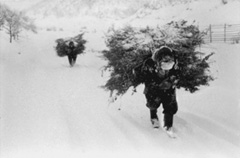Kotsunagi—Iriai, Commons in Japan
(“Kotsunagi—Yama o meguru hyakunen monogatari”) JAPAN / 2009 / Japanese / Color, B&W / Video / 120 min
JAPAN / 2009 / Japanese / Color, B&W / Video / 120 min
Director: Nakamura Kazuo
Archives, Photography: Kikuchi Shu
Photographs: Kawashima Hiroshi
Photography: Maejima Norihiko
Sound: Shinozaki Goroku
Music: Sanpei Tomoaki
Narrators: Suma Kei, Nakamura Kazuo
Planning, Producer: Kikuchi Fumiyo
Production Company: Shu
World Sales: Kotsunagi Exhibition Committee
In the mountain community of Kotsunagi, in northeastern Japan, litigation regarding common land rights continued from 1917 to 1975. A modern system of private ownership came to be enforced, in place of the tradition whereby anyone could freely enter the mountains and partake of their riches—the trees and their fruit. The trial ended in a loss for those opposing private ownership. Based on footage and audio interviews Kikuchi Shu and two others began to gather 40 years earlier, this work reveals the history of the struggle, while focusing on the way people live today and the problems of modernization in Japanese rural villages.
In Cooperation with: National Institute for the Humanities, Research Institute for Humanity and Nature (RIHN)
 Nakamura Kazuo
Nakamura Kazuo
Born in 1955 in Nagano Prefecture. Since graduating from university, Nakamura has worked as a filmmaker, producing educational, publicity, and documentary films. His works include educational films such as The Mold, Rice-Growing Regions, and Recycling Aluminum Cans, educational TV programs such as Experiment with Anything!, and the spot commercial for Tokyo Gas Amenity Dry. |
Producer’s Statement
 Starting in 1960, cameraman Kikuchi Shu joined Kawashima Hiroshi and Shinozaki Goroku in visiting the Kotsunagi area of the town of Ichinohe in Iwate Prefecture. The record they compiled over a number of decades, of the circumstances surrounding the trial over common land rights has at last been edited into a single film. Unfortunately, all three passed away without seeing the film to completion. Thanks to the efforts of younger production members, including Nakamura Kazuo, we are able to include something of the current state of affairs of Kotsunagi. Completing this took seven years. It was seven years spent learning from the way the people lived their lives in the mountains in generous cooperation with each other, even though the small community nestled in the hills had been split in two, and the deep wounds were lasting.
Starting in 1960, cameraman Kikuchi Shu joined Kawashima Hiroshi and Shinozaki Goroku in visiting the Kotsunagi area of the town of Ichinohe in Iwate Prefecture. The record they compiled over a number of decades, of the circumstances surrounding the trial over common land rights has at last been edited into a single film. Unfortunately, all three passed away without seeing the film to completion. Thanks to the efforts of younger production members, including Nakamura Kazuo, we are able to include something of the current state of affairs of Kotsunagi. Completing this took seven years. It was seven years spent learning from the way the people lived their lives in the mountains in generous cooperation with each other, even though the small community nestled in the hills had been split in two, and the deep wounds were lasting.
Common land rights are closely tied to the rights of local people to live in their area. As we commuted between Tokyo and Kotsunagi, however, we began to feel that the concept of “the commons” wasn’t just pertinent to mountain areas or farming and fishing villages; it is an idea with a deep connection to metropolitan life as well.
The essence of this film is that we are all children of the earth, that we are nothing more than a part of nature. In the hopes of sharing this message with a wide audience, especially the young who will shoulder the world in the future, we hope to screen this film throughout Japan, indeed throughout the world.
(Kikuchi Fumiyo)
